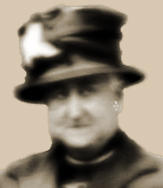Say hello, wave goodbye
However, skin is not the subject in hand.
When I was a small child, I deduced - from observation of the world around me - that womens' hair becomes curly when it goes grey. (I do remember finding it odd that men's hair didn't behave in the same way, but I was too young to recognise the significance of that fact for my scientific theory.) However, when I was about five, my grandmother took me on a longer walk than usual and into a shop run by a woman who had long, straight grey hair in a plait. Which goes to show that appearances can be deceptive. Particularly where women are concerned. The fact that 99.99% of old ladies have curly hair (or did, in the 1960s) doesn't necessarily imply that their hair has simply curled with age.
Having long dismissed my childish conclusion as having been based on an entirely false premise, I am beginning to wonder whether it contained an element of truth after all...
For more than 40 years* I had hair of such unrepentant straightness that rulers and pokers would hide themselves away from me in dark corners for fear of coming off worse in a comparison.
But I recently became aware that, when I touched the hair on the back of my head with my hand, it felt different. Feeling rather foolish, and bracing myself for gentle ridicule, I asked my hairdresser whether my hair had really developed a distinct wave.
What is interesting to me is that, not only did she immediately confirm that rulers and pokers may now co-exist with me in perfect confidence, but that she was not at all surprised by the change. She assured me that this happens to a lot of women "of a certain age" and, indeed, had happened to her some years earlier. (I gather it's a permanent alteration rather than a brief dalliance.)
While I'm not disconcerted in the slightest by the news that my hair will never again be ramrod-straight - frankly, I have many and various better things to worry about - I'm surprised this tendency of middle-aged women's hair hasn't been seized upon by the marketing mavens. After all, you can barely turn the television on without being assured that your "first greys" (pardon me while I wince in agony at that unwarranted abuse of a perfectly good adjective) can be covered up so that no-one will know you are no longer twenty-five.
I rely on advertising to alert me to the "signs of aging" about which I am expected to lose sleep, but I have never heard so much as a whisper about the waviness thing.
Which means
- the trichologists can't come up with a solution (not that this would usually stand in their way);
- the advertisers haven't been alerted to this potentially-lucrative new niche;
- adverts are aimed at women below the age of 45; or
- the phenomenon is far less widespread than my hairdresser believes.
Can anyone venture a guess as to which (or which combination) of those alternatives is the right answer? (I have to admit, this sounds like one for m'learned colleague, The Goldfish.)
The Editor
*Er, apart from a couple of years in the 1980s in which I succumbed to the demands of fashion and had my hair permed. This was not an unqualified success. Or a good look.











10 Comments:
No, you fool! Do you not realise what a monster you have unleashed upon the world?
It's bad enough that I already have to sit through adverts with pseudo-scientific mumbo jumbo about "pentapeptides" (basically, a chain of five amino acids joined together) and how it will make everyone's hair more shiny and new.
Now I'm no doubt going to have to listen to adverts with phrases like "contains rigiditin to keep your hair straight"...
...you'll have to excuse me, I'm going to wander off and grumble in the corner.
Ah, yes.
Good point.
Sorry.
Curly hair? I did the perm thing in the eighties too. It wasn't so much that I thought it was a bad look, it's just that I'm one of those rare people who needs the torture device with the heat clamps. I don't think that they even make the things anymore. The cold process ones really just don't work on me. I'd just get this sort of random frizzy thing instead of curls.
So maybe I have something to look forward to with the aging. That, and the monthly visitor that will cease to visit.
If I can't wait that long for the curly hair, I'd heard that either Revlon or Loreal was working on a curly hair pill. For the other problem I shall either have to just wait or have major surgury. I've put off the major surgury this long, so I think I'll just wait.
Maybe it's because adults are more likely to eat up all of their sandwich-crusts/vegetables/etc which, as every adult of my childhood averred, makes one's hair curly.
I have naturally wavy hair, which descends into positive curliness at the ends. And as my "first [and subsequent] greys" arrived, I did indeed note that they left waviness standing, bypassed curliness and arrived at kinkiness without so much as a backward glance. And they're much coarser, to boot. On a bad day, I look like I've stuck a wet finger in a power socket, as them thar pesky white hairs stick out at any angle they please.
Delightful, eh ?
Sphinxqueen,
You have reminded me that I had intended to make it clear that I'm not talking about grey hairs. My own grey hairs are coarse, wilful and sticky-outy.
The general trend towards waviness is affecting all of my hair: it's less unruly than the yobbish behaviour of my grey hairs, but it's definitely there.
Ooh, I don't know.
The reason older hair can be coarser and thus wavier or curlier is, I believe, to do with lower levels of moisture. And whilst both curling and straightening involves either chemicals or heat, I imagine having straightened already-dry hair and I picture Wurzel Gummage. It might be very tricky to do without causing damage, but I really wouldn't know.
However, I have two (male) friends and one mother to which this has occurred and they have all been rather pleased with the results. My Mum's hair was always wavy, but is now very full and curly and rather lovely (and it still doesn't look grey; it's just a much lighter shade of brown than it used to be). My friends, both in their mid-fifties, also enjoy increased volume and having their conservatively short hairstyles appear more interesting (they are both more image-conscious that your average middle-aged bloke).
So perhaps it is something that people don't complain about and thus nobody's picked up on? Of course, much of the "flaws" that cosmetics advertisers hope to relieve us off are things that we might not have previously noticed, but then if wavier hair was sold as a sign of aging to be "cured", that might seriously mess up the market for products for everyone who wanted wavier and curlier hair of all ages - probably a much bigger market.
Talking of aging and hair, my Granny reminded me the other day about a time when, as a child, I implored her not to dye her lovely white hair bright blue like all the other old ladies. Is it just me, or has the blue rinse become much less blue these days?
Huh.
Ah, well: there goes my hairdresser's theory that it's a womanly and hormonal thing.
Yes, it had crossed my mind that it might be financially counter-productive to badge wavy hair as one of those unpleasant indicators of aging.
What also occurred to me is that, as everybody who has dead straight hair always hankers after having at least wavy hair, it's possible that no-one has complained.
Marketing mavens or not, though, it still seems odd to me that this isn't a well-known phenomenon.
Gosh, yes: blue rinses. Whatever happened to them (And their less-common pink and lilac counterparts)?
My hair has always been curly. Very curly. A torment. I went grey at an early age, but it was curly from birth.
If you are having trouble dealing with your newly curly hair, I recommend the Tangle Teezer, a miraculous brush I specially imported from the U.K. after reading an article from the London Times. It has changed my life. If only this had been available in my youth, when my (straight-haired) mother dragged a fine-toothed comb through my hair every Sunday, without any conditioner (she was not aware there was any such thing as "conditioner"), I would not be the warped human being I am today.
Do a search online for Tangle Teezer. It looks like a dog brush, but it cuts through wet curly hair like butter. At last science has achieved something for me personally.
Two word answer: Shirley Temple. Now THOSE are curls. And on the head of a four-year-old cherub (or at least she was, when she was in all those movies that made her famous).
With little girls like her who are just naturally curly, waves never became something that people associate strictly with old age: someone who becomes curly later in life could easily be mistaken (for someone who hasn't known them long enough) for someone who has simply been curly all along.
Whereas gray hair is very predominantly associated with older age. Few children go gray ever. And if they do (I had a few gray strands as early as age 9 I think) they're not likely to have much.
Post a Comment
<< Home